#On the Banks of Plum Creek
Text
Reading On the Banks of Plum Creek as a child: Wow, it's so great that Laura and Mary get to live in this awesome new house instead of that weird little underground dugout.
Reading On the Banks of Plum Creek as an adult: PA INGALLS!! WHAT ARE YOU DOING??? YOU DO NOT HAVE THE MONEY FOR THIS!! The dugout is FINE!! You can wait a year until you actually HAVE a wheat crop and the money from it!! Why do you so shamelessly court disaster??
#little house#on the banks of plum creek#laura ingalls wilder#books#it's also shocking to realize that these books have plots#as a kid the plot is just 'stuff that happens'#it's just a bunch of episodes grouped together by the fact that they occur in the same place#so it's a surprise to find how the book so blantantly from the beginning sets up#'we need money i can't wait til we have money after the wheat crop we'll be rich'#'grasshopper weather? what's that?'
50 notes
·
View notes
Photo
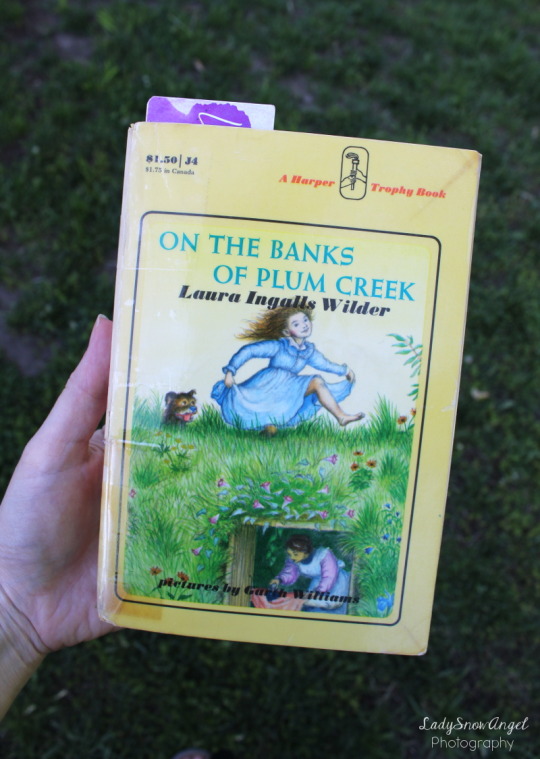
Spring reading: On The Banks Of Plum Creek by Laura Ingalls Wilder
#Little House#book#booklr#book photography#Laura Ingalls Wilder#read#reading#photography#photographers on tumblr#original photography#On The Banks Of Plum Creek
8 notes
·
View notes
Text
On the Banks of Plum Creek, by Laura Ingllas Wilder; Let the Hurricane Roar, by Rose Wilder Lane
I am putting these two together because they are essentially the same story, and also illustrates, at least to me, that Laura wrote pthe Little House books. As you read this ramble. Keep in mind. "Hurricane " was published in 1933, "Plum Creek" in 1937, but Laura wrote "Pioneer Girl" in *1930* and Rose not only helped her edit it, she typed the whole thing up after Laura finished writing it out long hand.
On the Banks of Plum Creek picks up after the Ingallses move away from Kansas. They settle into a dugout house on the banks of Plum Creek near Walnut Grove, Minnesota.
Caroline isn't enthused about living in a dugout, but Charles has big plans. He's going to plant wheat and he's going to build them a house with the profits. The weather is fine and mild and the wheat is coming up beautifully. The perspective price of wheat and the way the crop is looking inspires Charles to get the supplies for the house on credit and start building. All the while, life is happening. Laura learns some valuable lessons when it comes to minding her parents.
The family meets a Swedish couple and their daughter, who live near by, and eventually move into the fine new house Pa has built.
In the background people keep talking about how the weather is grasshopper weather. Laura doesn't know what that means, but it becomes clear soon.
Pa is over the moon about the wheat, and talks about it all the time. This crop will secure the family financially.
And then the grasshoppers come. They fly in in a cloud, dampening the sun. They decend on the area and eat everything. Grass, gardens, cloth, the wheat. After destroying the landscape, they laid their eggs meaning next year's crops were doomed as well. And then they all marched off and flew away.
Although the family does have a good Christmas because the church throws a party with gifts for the community, Pa must walk east to find work.
The next year is also plagued by grasshoppers and Pa has to make the trek east again. While the family is waiting for him, a blizzard hits. He makes it home to his frightened family in fairly good spirits because this cold means no grasshoppers for the next crop.
Laura wrote about this real life locust plague in Pioneer Girl and as horrific as the it sounds in the novel, the reality was even worse. And instead of walking east two years in a row, when the grasshoppers hatched again, Charles actually moved his family, which now included little brother Freddy, to Burr Oak Iowa. They went to partner with some friends, the Steadmans, in running hotel.
They didn't know that this was going to be a dark interlude.
Freddy passed away on the way to Iowa, and the pain for the whole family was such that Laura never wrote about it anywhere else.
In the hotel, Mary and Laura worked after school in the kitchen and dining rooms, and babysitting the Steadman's youngest child on the weekends. It was not the safest place to be either. Then the girls came down with measles. None of the family was paid for any of the work they did in the hotel, and the family quit the hotel, and eventually settled somewhat, but things were not great. Fires, violence and drama in the community. Charles had had enough and the family left to head back to Walnut Grove - in the dead of night to avoid debt collection. The best thing to come out of Burr Oak seemed to be the birth of the last Ingalls sister, Grace.
Let The Hurricane Roar was written by Rose and features a young couple, Charles and Caroline, newly married who head west after Charles 's father gives them enough money to make a claim. They live in a dugout, have a little boy, make friends with a Swedish couple living near by, and grow wheat that is destroyed by grasshoppers. Charles must leave to find work and Caroline spends a day in town trying to find work before deciding that it is better to be independent in her dugout with the baby. There is a blizzard that Charles must fight through to get home.
Slong with the basic story, there are several beats that are pretty much lifted right out of Pioneer Girl, including a line about a man who kept bees that left the area after the grasshoppers, saying that he refused to live in a place where even a bee can't make a living.
The writing in Hurricane is much different from any of the LH novels, and even in PG
The Hurricane tells the reader a lot, and doesn't show much until about halfway through. Description is sparse. It's trying to make a point from the get go. Hardship makes for a better life in the end, independence, even to the point of isolation is preferable to being dependent on anyone. Neighbors are nice, but something of a burden in good times and cannot be relied upon in bad times.
This is in direct contrast to Laura's writing which depends on description, and spends little time in exposition, shows more than tells. The characters are much different ad well, people value independence, yes, but are generally community minded founding churches, serving on school boards, helping neighbors.
There is the fact that she took elements of her grandparents and elements of her parents and mixed them together to make the story.
Charles in Hurricane gets money from his father to go out west. This is basically what happened when Almanzo decided to head west. He and Caroline end up on Wild Plum Creek in the Dakota Territory. Almanzo and Laura spent the early years of their marriage in De Smet South Dakota.
In essence, Rose took her parents and grandparents' stories, made a tale to appeal to her Libertarian ideals, and by many accounts, really pissed her mother off (which I'll get to later).
Hurricane isn't bad, it's compelling in its way, and effective for what it was trying to be, and I liked how it ended. However, it also serves as evidence that while the two Wilder women worked together and Rose was a brilliant editor, Laura wrote the classic novels.
#Laura Ingllas Wilder#book#books#book blogging 2023#On the Banks of Plum Creek#Let the Hurricane Roar#Rose Wilder Lane
0 notes
Quote
Plum trees were low trees. They grew close together, with many little scraggly branches all strung with thin-skinned, juicy plums. Around them the air was sweet and sleepy, and wings hummed.
from On the Banks of Plum Creek by Laura Ingalls Wilder
0 notes
Text
Laura had not known there were such wonderful books in the world. On every page of that book there was a picture and a rhyme. Laura could read some of them. She forgot all about the party.
By the Banks of Plum Creek, Laura Ingalls Wilder
0 notes
Note
Dw, Creek's plastic surgeon regrets giving him an hourglass figure on purpose too 👍 At least they made bank off of it tho.
the reason we dont see dr plum plimsy anymore is bc she overcharged creek for his hip augmentation and then skipped town
9 notes
·
View notes
Text
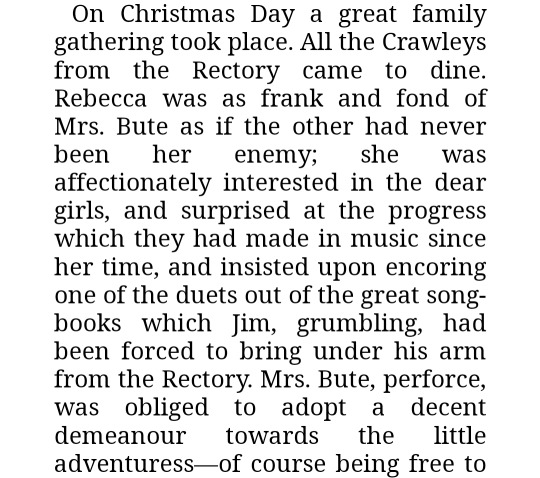
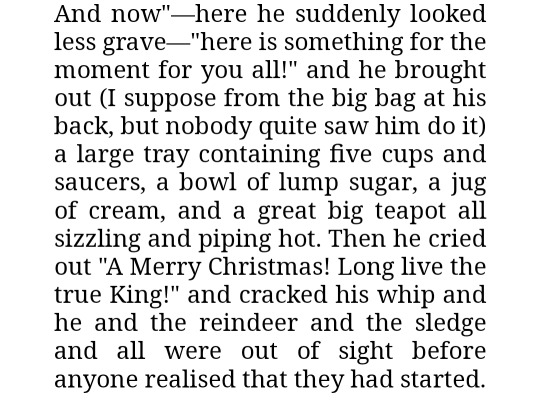
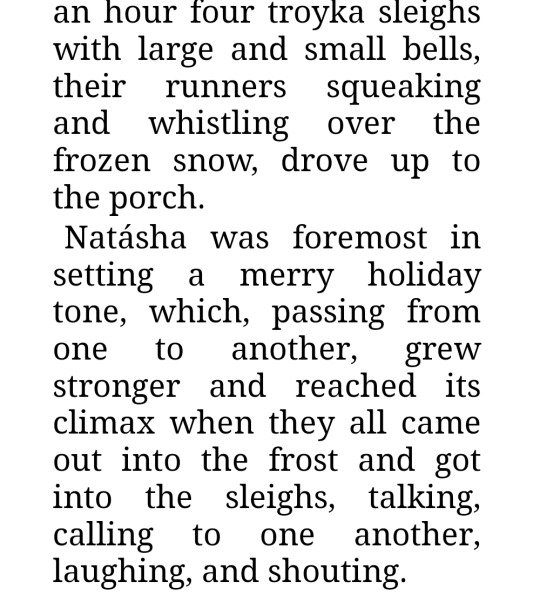
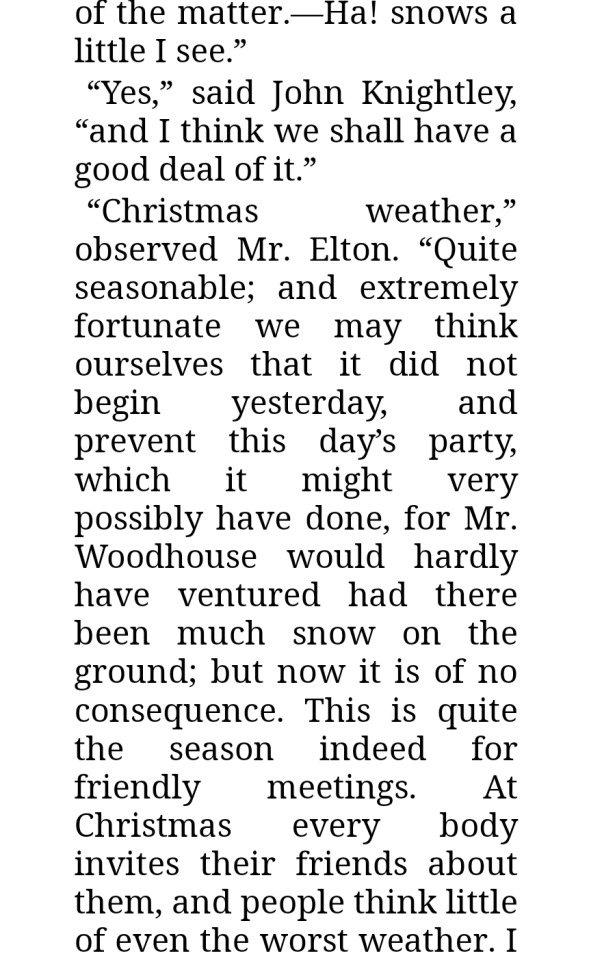

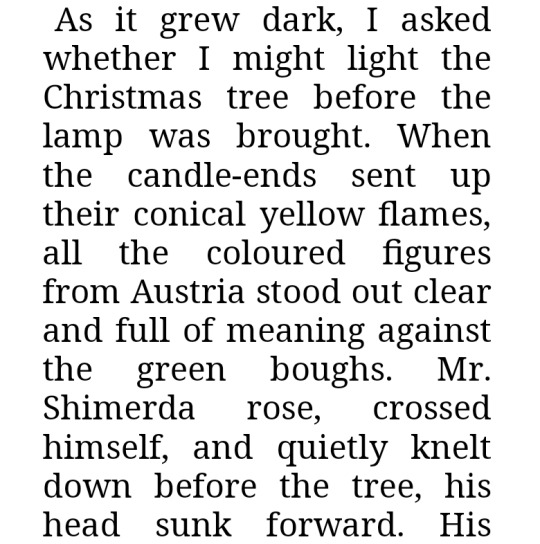
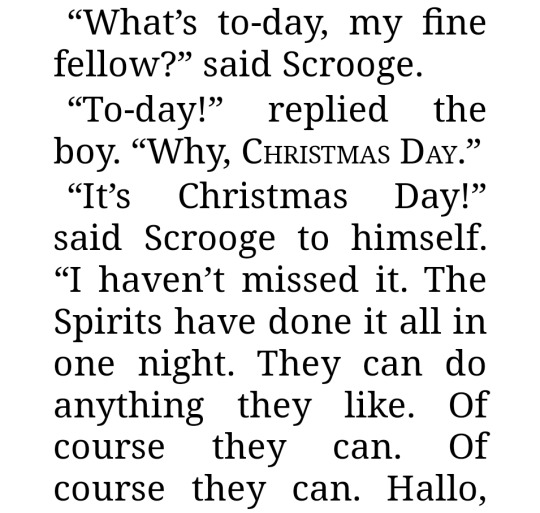

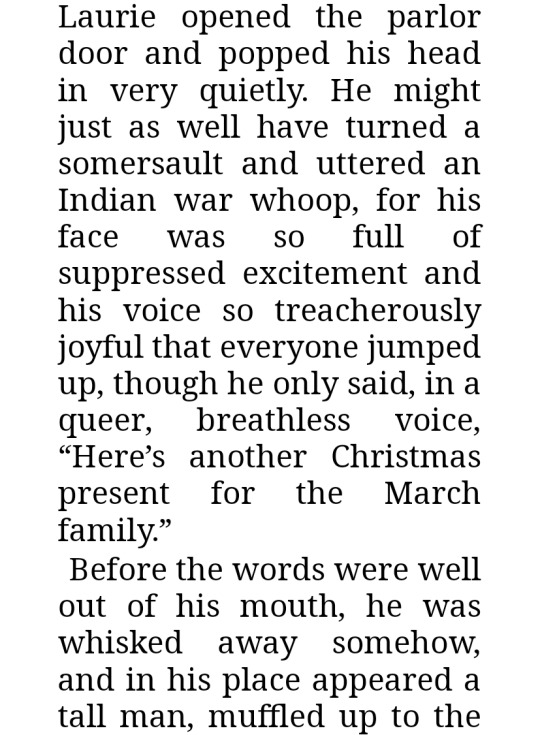
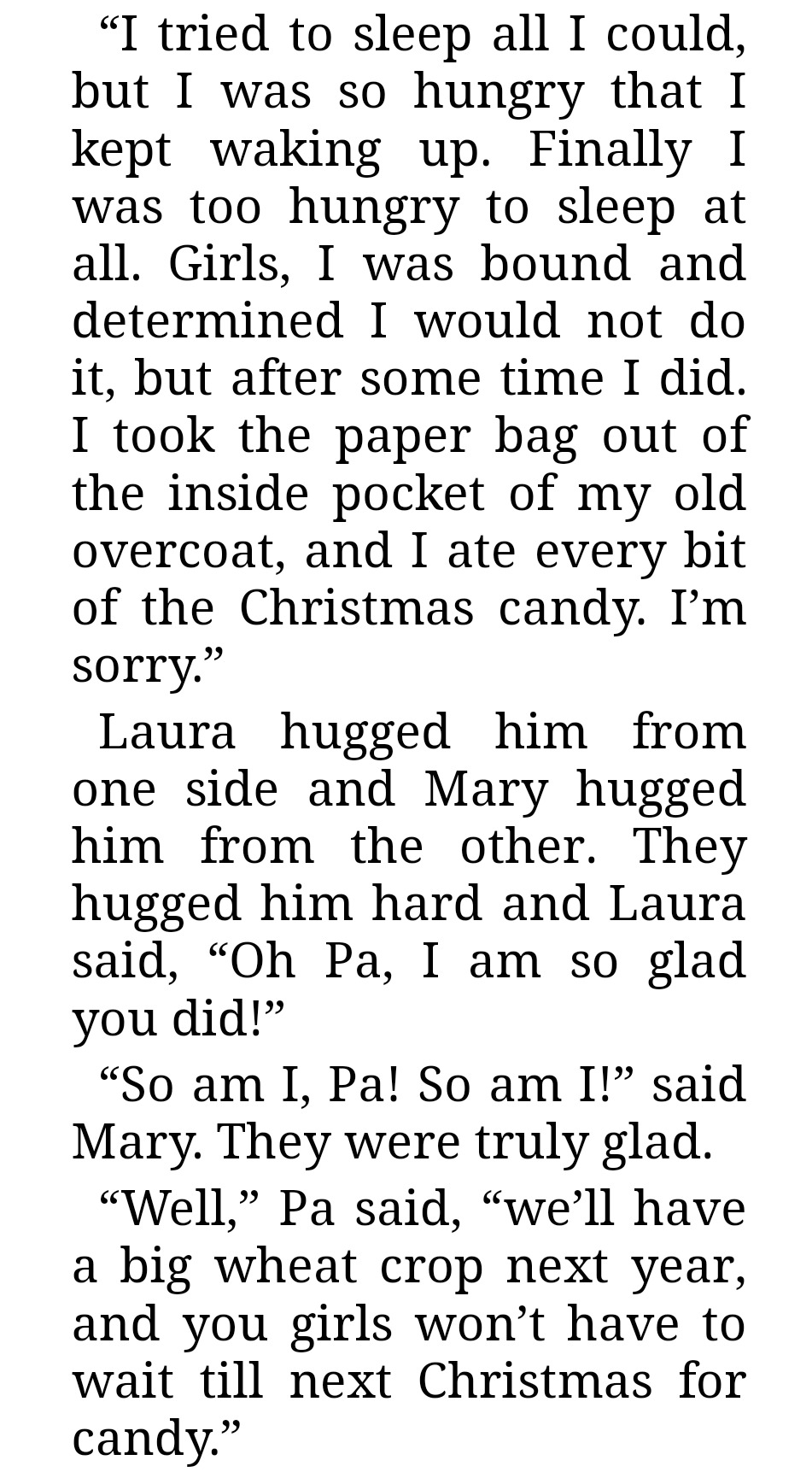
Memorable Literary Christmases
Little Women, Louisa May Alcott // The Lion, the Witch, and the Wardrobe, C.S. Lewis // War and Peace, Leo Tolstoy // Gone with the Wind, Margaret Mitchell // Emma, Jane Austen // Anne of Green Gables, L.M. Montgomery // My Antonìa, Willa Cather // A Christmas Carol, Charles Dickens // Vanity Fair, William Makepeace Thackeray // On the Banks of Plum Creek, Laura Ingalls Wilder
#all excerpted from project Gutenberg for ease of access#most of my copies of these books are in another city#intertextuality#unto us a child is born#literature makes us more human#pontifications and creations
37 notes
·
View notes
Text
this is embarrassingly late but I was tagged by @pangaeastarseed and iirc @babycupart (who tagged my main) for this and I legitimately waited because the last song I had heard was decidedly uncool and I was waiting for a better one to come up to fulfill this ... anyways here we go!
3 ships you like: for DS9 it's gonna be most Dukat stuff just because I like rare/absurd ships. I legit went into the series ready to be indoctrinated into Garashir for the popular ship privilege, but true to form I grew attached to the gnarliest gremlin-souled reptile of the series and now I kinda love Garak/Dukat and Sisko/Dukat. Intendant Kira/Dukat would probably round out that group!
First ship ever: Yamato/Mimi from Digimon, though I turned into a Sorato shipper real fast hahahahahahah (iykyk)
Last song you heard: fml legitimately forgot I was doing this so now it's S Club 7's Say Goodbye because I was doing a wikipedia deep dive
Favorite childhood book: On the Banks of Plum Creek by Laura Ingalls Wilder. I am aware that the series and LIW is problematic in a lot of ways, but man did that book truly capture the devastation of having a beloved stuffed animal forcefully given away. Plus some petty mean girl gets served catharsis via Nellie Olsen.
Currently reading: The Mill House Murders by Ayatsuji Yukito
Currently watching: Agatha Christie's Marple
Currently consuming: a date + banana + peanut butter milkshake
Currently craving: nothing, this milkshake thicc and I am extremely full
literally everyone I follow has completed this in some way u_u so if this comes across your dash and you'd like to share, please consider yourself tagged by me!! (and tag me so I can be nosey and snoop your replies)
3 notes
·
View notes
Text
Hot take maybe but On the Banks of Plum Creek is better than Little House on the Prairie.
#the motherfucking grasshoppers#really looking forward to on the shores of silver lake#you know. like a sicko.
3 notes
·
View notes
Text
La casa nella prateria, i romanzi
Forse non tutti sanno che la serie televisiva La casa nella prateria è stata tratta da una serie di romanzi dal titolo originale Little House, scritti tra il 1943 e il 1945 dalla scrittrice statunitense Laura Ingalls Wilder. Se siete amanti dei romanzi di Louise May Alcott (Piccole donne) e Lucy Maud Montgomery (Anna dai capelli rossi) credo vi potrebbe veramente piacere questa serie di romanzi che è stata pubblicata più volte anche in Italia col titolo La piccola casa nella prateria, l'ultima edizione in ordine cronologico è di Gallucci editore ed è di facilissima reperibilità.
Link: https://www.galluccieditore.com/
Laura Elizabeth Ingalls Wilder (Pepin, 1867 – Mansfield, 1957) prese a ispirazione la sua stessa infanzia per scrivere i suoi romanzi, infatti aveva appena quattro anni quando suo padre decise di lasciare il Wisconsin per cominciare una nuova vita nei territori messi a disposizione dei coloni dal governo americano.
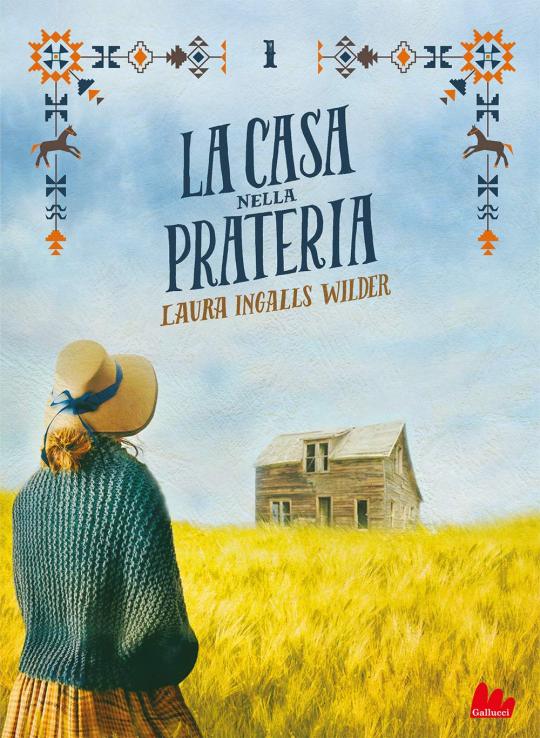
La serie ed Little house è composta da 9 libri:
1. La casa nella prateria (titolo originale Little House on the Prairie) Link: https://amzn.to/3tfLaNa
Trama: In viaggio verso il Kansas con la famiglia Ingalls. La vita nella prateria è difficile e talvolta persino pericolosa, ma papà, mamma, Mary, Laura e la piccola Carrie sono felici di realizzare il sogno di una nuova vita
2. Sulle rive del Plum Creek - La casa nella prateria 2 (titolo originale On the Banks of Plum Creek)
Link: https://amzn.to/3F2TSB7
Trama: La famiglia Ingalls comincia una nuova vita nel Minnesota. Mamma e papà lavorano sodo per costruire una casa e coltivare la terra, Mary e Laura cominciano la scuola e la piccola Carrie cresce a vista d'occhio. Le difficoltà e i pericoli sono tanti, nella prateria, ma gli Ingalls li affrontano con tenacia e ottimismo.
3. Sulle sponde del Silver Lake - La casa nella prateria 3 (titolo originale By the Shores of Silver)
Link: https://amzn.to/46vmQFf
Trama: Laura e la sua famiglia si trasferiscono nel Sud Dakota, con la speranza di farsi assegnare un appezzamento di terreno in cui stabilirsi defi nitivamente. Ogni giorno sulle sponde del Silver Lake arrivano coloni in cerca di fortuna. Gli Ingalls dovranno darsi molto da fare per difendere la loro futura fattoria.
4. Il lungo inverno. La casa nella prateria: 4 (titolo originale: Long Winter)
Link: https://amzn.to/46Qlkht
Trama: Gli Ingalls affrontano con coraggio il terribile inverno nel Dakota. In casa tutta la famiglia lavora sodo per sopravvivere alle tempeste di neve. Ma l’intero paese resta senza provviste e il giovane Almanzo Wilder decide di affrontare un pericoloso viaggio alla ricerca di cibo…
5. Piccola città del West. La casa nella prateria: 5 (titolo originale Little Town on the Prairie)
Link: https://amzn.to/3tlqLpS
Trama: Con l’arrivo della primavera la famiglia Ingalls può finalmente partecipare alla vita sociale della piccola città del West in cui si è trasferita. Laura stringe amicizia con Almanzo Wilder, il suo futuro marito, e lavora con impegno per guadagnare il necessario a far studiare Mary all’università.
6. Gli anni d'oro. La casa nella prateria: 6 (titolo originale These Happy Golden Years)
Link: https://amzn.to/3PDdKjc
Trama: Laura è cresciuta, vive lontana dalla famiglia e insegna in una scuola... anche se molti dei suoi alunni sono più alti di lei! Ma ogni venerdì il suo amato Almanzo Wilder viene a prenderla e la riporta a casa per il fine settimana. Sono anni felici, che preludono a nuove e importanti tappe della vita.
7. I primi quattro anni. La casa nella prateria: 7 (titolo originale: The First Four Years)
Link: https://amzn.to/3PGZFB6
Trama: Laura e Almanzo Wilder, appena sposati, cominciano con grandi speranze la loro vita insieme in una casetta nella prateria. Ma ogni stagione porta inattesi disastri: tempeste, malattie, incendi, debiti. I due giovani non intendono però lasciarsi abbattere. Anche perché ora la famiglia è cresciuta…
8. Nei grandi boschi del Wisconsin. La casa nella prateria Prequel (titolo originale Little House in the Big Woods)
Link: https://amzn.to/3PHYJfQ
Trama: Questo romanzo racconta la prima infanzia di Laura Ingalls che, a quattro anni, vive ancora in una piccola casa di legno, ai margini dei Grandi Boschi del Wisconsin. C’è sempre tanto da fare per tutti ma la sera, dopo una lunga giornata di lavoro, le allegre note del violino di papà riuniscono la famiglia felice intorno al fuoco.
9. La storia di Almanzo. La casa nella prateria Prequel 2 (titolo originale Farmer Boy)
Link: https://amzn.to/3PYoA4q
Trama: Qusto romanzo racconta invece l'infanzia del futuro marito di Laura, Almanzo. Mentre Laura Ingalls cresce all’Ovest, Almanzo Wilder nasce in una prosperosa azienda agricola nello stato di New York. Qui, insieme al fratello e alle due sorelle, lavora dall’alba al tramonto nei campi e nelle stalle, con qualunque tempo e in ogni periodo dell’anno. Ma di tanto in tanto c’è anche modo di divertirsi…
Questi libri oltre ad ispirare la serie televisiva che tutti abbiamo visto e che va tuttora in onda in replica sui nostri schermi televisivi ogni giorno sul canale 27 del digitale terrestre, ha anche dato vita ad un cartone animato giapponese prodotto tra il 1975 e il 1976 dal titolo Laura (Sōgen no shōjo Rōra, lett. "Laura la ragazza delle praterie) che andò in onda anche in Italia, ma sinceramente non lo ricordo perchè all'epoca non ero ancora nata e poi non ne lo hanno trasmesso molto in reoplica immagino. Però se vi interessa recuperarne qualche puntata qualcosa su Youtube c'è.
La serie televisiva americana La casa nella prateria è disponibile con tutte le sue stagioni anche su Prime video, nel caso vi interessi
Prova Prime video: http://www.amazon.it/provaprime?tag=weirde-21
E si possono acquistare anche i dvd qui: https://amzn.to/3PFXmhD
2 notes
·
View notes
Text
on the banks of plum creek was the most beautiful of the house on the praire books imo, reading it made me so so happy as a child, on the shores of silver lake was too bittersweet, i remember some very sad things happening in it, the neurodivergent in me did reread the house construction chapters of the little house on the praire book over and over i loved the descriptions of cutting the logs into shape and when they finally built the fireplace in the house i was so deeply satisfied
settler colonialism obviously aside as i was a child and not reading them as critically as i would now (though i was made aware!) those books were really so formative for me and were such a rich tapestry thank u laura ingalls wilder for ur writing <3
8 notes
·
View notes
Text
It's amazing how every chapter in On the Banks of Plum Creek has blatant foreshadowing in the form of either, "It's extremely important that we have a good wheat crop this year," or "Here's how the weather is perfect for grasshoppers," and the grasshopper plague still manages to feel like a completely out-of-the-blue apocalyptic event.
#on the banks of plum creek#little house#laura ingalls wilder#books#i'll be haunted by the image of ma shoveling grasshoppers into the stove#and skimming them out of the milk
37 notes
·
View notes
Text
Listen to On the Banks of Plum Creek by Laura Ingalls Wilder on Audible. https://www.audible.com/pd/B01N6STE0J?source_code=ASSOR150021921000R
0 notes
Text
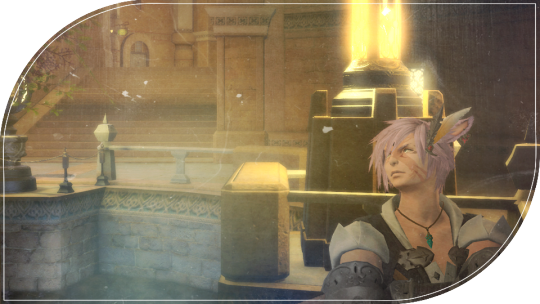
MiqoMarch'24, Day #20: - town -
When he was 20 years of age, D'nyr left home to study pugilism in Ul'dah, with the hopes of becoming stong enough to protect those who he cared about most.
He lived on the outskirts of Stonesthrow in a small camp of his own making, near the western banks of the creek and well out of sight of the nearby encampments; after a few bad encounters he learnt to make his camp appear unassuming, else some his things might not be there when he returned… he had a modest stash of gil he brought with him from home which he saved for potable water, fruit & veg and important necessities (and always kept in two separate stashes), and he made do living off the land as best he could by hunting, foraging and using the creek for washing & hygiene (deeper/better quality water was found nearer the waterfall, if you were daring enough!).
He had two routines that he followed to a fault: here is one of them!
On days that he was studying, he would start the morning by waking early at 5:30am to clamber up the cliffside and watch the sunrise, his favourite morning ritual. Then he would bathe in the creek and get ready for the day, have a quick bite to eat (eg. boiled eggs or oats) and then spend the next 2 hours hunting/spearfishing, foraging and checking traps for easy meat like marmots/small game animals. He would stash it away for later in a makeshift cold storage pit he set up in a nearby cave, as well as setting up any carcasses to drain while he's out. He had intensive training at the guild with Master Hamon from 9am-1pm, and would then head back to his camp and have a small lunch of dried jerky or damper with a preserve (he likes pixie plum jam the most)-- and if he had enough gil to treat himself, he might buy a rolanberry lassi from the Ul'dahn vendors and sit awhile doing some people-watching in the markets.
Following this, he would head back to his storage pit to retrieve the now-drained carcasses and would then meticulously skin/divide/preserve the meat, bones and whatnot, sorting them into two separate piles; things he can keep to cook with, use or store, and things he can sell for gil. D'nyr stores anything not needed for tonight's supper and then heads back to his camp, ingredients in hand-- he enjoys soups and "slow-cooker" meals he that can put on while training (shakshuka is a favourite), so most of this time is spent preparing his meat and veg.
At 3pm when dinner is simmering away, he begins his own solo training with plenty of short breaks in-between; he leans more towards things he can do without specialised equipment like running, pushups and cardio exercises, bicep curls (using heavy stones) or pull-ups (using one of the many thick branches of the trees in this area-- and never the same one for long, in case it breaks). Finishing up at 6pm, he would go down to the river to wash his clothes (it doesn't take long to dry at least, even at this time of day!) and then head back to camp to finish cooking and eating dinner. By this point he was usually pretty knackered so he would wind down for the evening by making some chamomile tea, stargazing or repairing damaged clothes/items, followed by an early night around 9pm.
(…His days off were comparatively simple, in stark contrast! He would dedicate them to just one or two tasks at most, including such highlights as: exploring, barehand fishing, taking on odd jobs for gil, "nap day", goofing off posing with Cactuars in W.Thanalan, and hanging around the Ul'dah markets for a spot of peoplewatching and taking in the sights/smells/gossip.)
#MiqoMarch2024#MiqoMarch#ffxiv#d'nyr#d'nyr fellcrest#town > city > uldah was my leap of logic here#I ended up spending all day yesterday + day before working on setting this up so it's A LOT more than I meant to write on the topic!#search history got all kinds of stuff like ''pre-plastic storage methods...historical dental hygiene practices...how shallow is a creek...'#''do nuts grow in the desert...how do you make nopal juice...'' and also a lot of scoping out vendors and specific locations and lore
1 note
·
View note
Text
Some books and plays I have read that are older than me oand/or were written before I was born:
Plays:
• Much Ado About Nothing by William Shakespeare
• The Tempest by William Shakespeare
• Romeo and Juliet by William Shakespeare
• Hamlet by William Shakespeare
• Julius Ceasar by William Shakespeare
• A Midsummer Night's Dream
• Oedipus Rex by Sophocles
• Our Town by Thornton Wilder
Fairy Tales and Fables:
• The Little Mermaid by Hans Christian Andersen
• The Little Match Girl by Hans Christian Andersen
• The Snow Queen by Hans Christian Andersen
• The Ugly Duckling by Hans Christian Andersen
• The Emperor's New Clothes by Hans Christian Andersen
• The Nightingale by Hans Christian Andersen
• The Princess and the Pea by Hans Christian Andersen
• The Most Incredible Thing by Hans Christian Andersen
• The Frogs and the Ox;Belling the Cat;The Town Mouse and the Country Mouse;The Fox and the Grapes;The Wolf and the Crane;The Lion and the Mouse;The Crow and the Pitcher; The Fox and the Stork;The Fox and the Leopard;The Wolf in Sheep's Clothing;The Wolf, the Kid, and the Goat;The Lion's Share;The Wolves and the Sheep;The Ass in the Lion's Skin;The Farmer and the Snake; They Dog and the Oyster;The Wolf and the House Dog;Three Bullocks and a Lion; The Vain Jackdaw and His Borrowed Feathers;The Dogs and the Fox;The Farmer and the Cranes; and The Goose and the Golden Egg... by Aesop
• The Frog King; Cat and Mouse Partnership; The Story if the Youth Who Went Forth To Learn What Fear Was; The Wolf and the Seven Little Kids; Faithful John; Little Brother and Little Sister; Rapunzel; The Three Little Mean in the Wood; Hansel and Gretel; The Three Snake-Leaves; The White Snake; The Fisherman and His Wife; The Valiant Little Tailor; Cinderella; The Riddle; The Mouse, The Bird, and the Sausage; Mother Holle; The Seven Ravens; Little Red Cap; The Singing Bone; Clever Hans; The Wedding of Mrs. Fox; The Robber Bridergroom; Godfather Death; The Juniper Tree; The Six Swans; Briar Rose (Sleeping Beauty); Little Snow White; Rumpelstiltskin; The Golden Bird; The Dog and the Sparrow; Frederick and Catherine; The Two Brothers; The Queen Bee; The Three Feathers; The Golden Goose; The Twelve Hunters; The Three Sons of Fortune; The Wiof and the Fox; The Fox and His Cousin; The Water Nixie; Brother Lustig; The Fox and the Geese; The Poor Man and the Rich Man; The Raven; The Peasant's Wise Daughter; Stories about Snakes; Hans the Hedgehog; The Three Brothers; Ferdinand the Faithful; One-eye, Two-eyes, and Three-eyes; The Shoes that Were Danced To Pieces; Iron John; The Lambkin and the Fish; The Lord's Animals and the Devil's; The Old Beggar Woman; Odds and Ends; The Sparrow and His Four Children; Snow White and Rose Red; The Wise Servant; The Glass Coffin; The Griffin; The Peasant in Heaven; The Bittern and Hoopoe; The Owl; Death's Messengers; The Spindle, the Shuttle, and the Needle; The Drummer; The Ear of Corn; Old Rinkrank... written/retold by the Brothers' Grimm
The 1800s- late 1930s set books:
• Big Red by Jim Kjelgaard
• The Yearling by Marjorie Kinnan Rawlings
• The Sign of the Beaver by Elizabeth George Speare
• Black Beauty by Anna Sewell
• White Fang by Jack London
• Call of the Wild by Jack London
• A Christmas Carol by Charles Dickens
• Little House in the Big Woods by Laura Ingalls Wilder
• Farmer Boy by Laura Ingalls Wilder
• Little House on the Prairie by Laura Ingalls Wilder
• On the Banks of Plum Creek by Laura Ingalls Wilder
• By the Shores of Silver Lake by Laura Ingalls Wilder
• The Long Winter by Laura Ingalls Wilder
• Little Town on the Prairie by Laura Ingalls Wilder
• Anne of Green Gables by Lucy Maud Montgomery
• Anne of Avonlea by Lucy Maud Montgomery
• Anne of the Island by Lucy Maud Montgomery
Edgar Allan Poe Works I've Read:
• The Raven; a poem
• Annabel Lee; a poem
• Lenore; a poem
• To Helen; a poem
• The Black Cat; a short story
• The Cask of Amontillado; a short story
• Ligeia; a short story
• The Masque of the Red Death; a short story
• Morella; a short story
• The Pit and the Pendulum; a short story
• The Premature Burial; a short story
• The System of Doctor Tarr and Professor Fether; a short story
• The Tell-Tale Heart; a short story
Oldie But Goldies; Everything Else Thst is Older Than Me That I've Read:
• Winnie-the-Pooh by A. A. Milne
• Alice in Wonderland and Alice Through the Looking Glass by Lewis Carroll
• The Lion, the Witch, and the Wardrobe; Prince Caspian; The Voyage of the Dawn Treader; The Silver Chair; The Horse and His Boy; and The Magician's Nephew by C. S. Lewis
• Charlotte's Web by E. B. White
• The Hobbit by J. R. R. Tolkien
• The Wind in the Willows by Kenneth Grahame
• Redwall by Brian Jacques
• Frog and Toad by Arnold Lobel
• The Phantom Tollbooth by Norton Juster
• The Giver by Lois Lowry
• The Velveteen Rabbit by Margery Williams
• The Tale of Despereaux by Kate DiCamillo
• Mr. Popper's Penguins by Richard and Florence Atwater
There is a lot I've probably read but don't remember, but these are the literatures I can remember that are older than me, or were made before I was born, that I have read😊
0 notes
Text
Also, tell me in the notes which character you were when you played Little House with your siblings!
#i was usually mary#because i was older duh#even though my little sis had like. negative interest in reading the little house books#even though they're very different books/series Little House Anne of Green Gables and Little Women live on the same shelf in my head#thus i feel like knitting circle folks will have Opinions on this#pontifications and creations#polls
24 notes
·
View notes